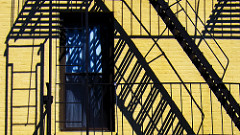by L. S. KLATT
The lifesaver found himself on a fire escape reading
a set of instructions. Step 1 directed him to match
the conflagration in his mind with a facsimile
that appeared in a diagram on the page.
That much was obvious, but Step 2 required careful
application: facing the riot & attempting to
extinguish it. This was complicated by the reality
that before him were hoses, claws, rakes, hooks, & wrenches—tools
which, it seemed, had something to do with firefighting.
What the volunteer had envisioned was a collapsed barn
in the middle of a swale, horses trampling a stand of green
rushes, a canoe overturned waterside. Below
him, however, being lobbed from the street, Molotov cocktails
troubled the semblance. Yet he continued to fancy
panicked mares fleeing the imaginary barn as it erupted
into blaze. The rushes added a dreaminess. To his
way of thinking, the fugitives represented
a roving ardor bereft of wisdom. Fair enough.
The rest of his company worked just out of sight; the truth
of the occupied city block was new to the lifesaver.
L. S. Klatt‘s poems have appeared or will appear in Surface, Copper Nickel, Sycamore Review, the Kenyon Review Online, Denver Quarterly, and Bateau. His fourth book, a collection of prose poems entitled The Wilderness After Which, came out from Otis Books (Seismicity Editions) in 2017.




